Archive for the 'Board Games' Category
Posted by James (admin) on 26th August 2013
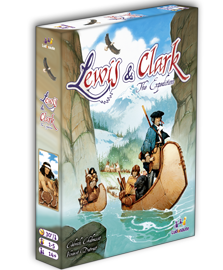 Lewis & Clark is a race to be the first player whose camp reaches the Pacific Ocean. Players have cards, indians and resources and each player has a board showing several boats in which they store their resources and indians, and which boat these are placed in also makes a difference too.
Lewis & Clark is a race to be the first player whose camp reaches the Pacific Ocean. Players have cards, indians and resources and each player has a board showing several boats in which they store their resources and indians, and which boat these are placed in also makes a difference too.
Cards are dual use (double-sided) – they can be used for their action, or for their strength. When a card is played to perform an action, it must be accompanied with either another card and/or indians to set its strength which determines how many times the action can be performed. Actions allow players to move their scout forwards, gather other resources, improve their expedition, etc. Quite often the number of resources gained is based on the card you and your neighbouring payers have in front of them.
Players can also send indians from their exploration party to the village to perform actions there instead. During the game, the player advances their scout across the country and, at times, they will move their camp forwards. Players who use/allocate most of their resources and indians before they move their camp will advance the most. Read the rest of this entry »
Tags: board game news, Board Games, board gaming, Essen, Lewis & Clark, Ludonaute, Spiel 13, Spiel 2013
Posted in Board Games, Essen Spiel 13, Lewis and Clark, On the Radar, Spiel 2013 | No Comments »
Posted by James (admin) on 25th August 2013
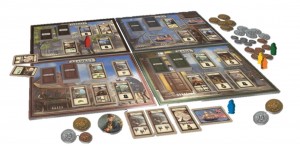 One of my favourite games ever is Oregon (which was the game the designers of Rattus made before Rattus). So, this year, I’m very excited that the Bergs have created a new, original game called Packet Row, which contains a very promising game mechanic.
One of my favourite games ever is Oregon (which was the game the designers of Rattus made before Rattus). So, this year, I’m very excited that the Bergs have created a new, original game called Packet Row, which contains a very promising game mechanic.
During a round, one player is the lead player (the harbour master) and they select an area of the board. Players take turns choosing to either take one of the cards from this area or pass. The harbour master is the last player to choose – they can either choose a card (which ends the round) or they can choose a new area and all players who did not take a card this round have the same choice again. This cycle ends as soon as the harbour master takes a card – at which point the round is over and any players that did not take a card yet (hoping/expecting the harbour master would move to another area before selecting a card) get nothing. I really like the sound of the psychological play here. Read the rest of this entry »
Tags: board game news, Board Games, board gaming, Essen, Packet Row, Spiel 13, Spiel 2013
Posted in Board Games, Essen Spiel 13, On the Radar, Packet Row, Spiel 2013 | No Comments »
Posted by James (admin) on 24th August 2013
 I always have time for Funforge’s games as they’re always really nicely produced. This year, they are releasing a light, space-themed game called Quantum. Players have dice (which are ships) that travel between the planets trying to colonise them (place cubes on them). The first player to place all their cubes wins.
I always have time for Funforge’s games as they’re always really nicely produced. This year, they are releasing a light, space-themed game called Quantum. Players have dice (which are ships) that travel between the planets trying to colonise them (place cubes on them). The first player to place all their cubes wins.
The ships (dice) are rolled to determine what type of ship they are – a low number means they can not move far but are powerful in combat, and vice versa. In fact, the dice number is how many spaces they can move. However, each type of ship has a special power too, such as transporting another ship, swapping places, changing a ship’s value.
On their turn, a player can take 3 actions. An action can be to move/attack with a ship, re-roll a ship, bring a ship on from the scrap yard, carry out research, or use 2 actions to construct a quantum cube on a planet which still has space for one. A player can place a cube if they have ships next to the planet that add up to the planet’s number, or if they win enough combats. Read the rest of this entry »
Tags: board game news, Board Games, board gaming, Essen, Funforge, Quantum, Spiel 13, Spiel 2013
Posted in Board Games, Essen Spiel 13, On the Radar, Quantum, Spiel 2013 | No Comments »
Posted by James (admin) on 24th August 2013
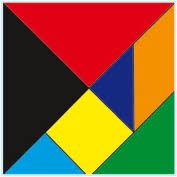 Yes, that magical time of the year when good (grown-up) children get new toys is almost upon us. No, not Christmas but Spiel – the biggest annual games fair held in Essen in Germany. I shall be going as usual this year – making it my 9th year running.
Yes, that magical time of the year when good (grown-up) children get new toys is almost upon us. No, not Christmas but Spiel – the biggest annual games fair held in Essen in Germany. I shall be going as usual this year – making it my 9th year running.
With 61 days to go, I have started my usual preparations by going through all the new games that will be released. There are still many to be revealed yet but plenty have been announced, so it’s the time of year when I find most of my reading is reading through board game rules.
Last year, I had a separate page where I mentioned forthcoming Spiel games that caught my attention. This year, I’m going to do it a bit differently and will post about each game separately as that makes it easier for those of you that read this blog via RSS. I’ll use a common tag so you’ll be able to filter just the Spiel 2013 entries, plus there will be a link to them at the top of the right-hand column.
James.
Tags: board game news, Board Games, board gaming, Essen, Spiel, Spiel 2013
Posted in Board Games, Essen Spiel 13, Spiel 2013 | No Comments »
Posted by James (admin) on 21st August 2013
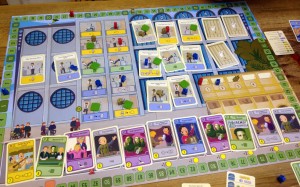 Friedmann Friese’s game of Copycat has the players trying to win votes in an election and which knowingly uses game mechanics from Dominion, Through the Ages and Agricola (with permission from their respective designers too). I’m always interested in Friese’s designs as there’s usually some unusual game mechanic or twist within them – they don’t always work for me but they’re much more often hits than misses.
Friedmann Friese’s game of Copycat has the players trying to win votes in an election and which knowingly uses game mechanics from Dominion, Through the Ages and Agricola (with permission from their respective designers too). I’m always interested in Friese’s designs as there’s usually some unusual game mechanic or twist within them – they don’t always work for me but they’re much more often hits than misses.
Essentially, Copycat game is a mix of worker placement and deck building. The player that gains the most votes (VPs) by the end of the game wins and the game ends after 10 rounds or when specific final cards have been bought. Each player has their own deck of cards (identical at the start) and each round players draw 5 cards from their decks. Each card has a number on it and, the first action of each round, is to simultaneously discard one card using the number on it to determine turn order. More powerful cards have higher numbers, so you have to balance using a good card to go first against using a card for its more powerful effect. Read the rest of this entry »
Tags: Copycat, Friedmann Friese
Posted in Board Game Review, Board Games, Copycat | No Comments »
Posted by James (admin) on 19th August 2013
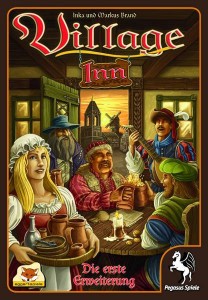
I really like Village as a game – it has you juggling lots of things at once without enough time or resources to do everything; you have to think about the other players who may take the actions/resources you want before you do so you have to prioritise what you take first and maybe alter your plans on the fly if someone has now taken something you were going to; and, players sometimes kill off their villagers on purpose so they can grab their points scoring positions in the village’s journal and by doing so means you have to watch out for the game ending sooner than you think or want. This makes a very entertaining game and I was glad it deservedly won the Spiel des Jahres last year. (The following assumes you know about the Village base game – if not, you can read my review of it here.)
As I liked the main game, I was pleased to hear there would be an expansion. However, I have realised over the years that the majority of expansions (especially for non-narrative games) end up adding more noise than gameplay – some friends and I worked out recently that we usually buy expansions because we’d like to see extra variety, but then more often end up playing the base game without the expansion because it’s usually tighter. So, into which of these categories was Village’s expansion (called Village Inn) going to fall? Read the rest of this entry »
Tags: board game news, Board Games, board gaming, Pegasus Spiele, SdJ, Spiel des Jahres, Village, Village Inn
Posted in Board Game Review, Board Games, Village, Village Inn | No Comments »
Posted by James (admin) on 19th July 2013
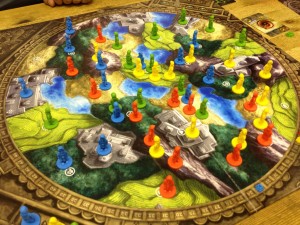 Aztlán is an area-control game which looks innocent on the surface but, underneath, there’s the constant lure to sabotage your opponents which can be devastating – which is one aspect that attracted me to the game. Plus, it’s by Leo Colovini and I find I like his games (Atlantis, Masons, Clans, Carolus Magnus).
Aztlán is an area-control game which looks innocent on the surface but, underneath, there’s the constant lure to sabotage your opponents which can be devastating – which is one aspect that attracted me to the game. Plus, it’s by Leo Colovini and I find I like his games (Atlantis, Masons, Clans, Carolus Magnus).
Each player is an Aztec tribe and the board shows a land divided into territories and each territory has a terrain type (jungle, mountains, etc.) The game lasts 5 rounds (Ages) during which players take turns, and the player with the most victory points (VPs) at the end of the game wins. On their turn, a player must place 1 of their people figures into the board, plus the player can optionally move 1 of their figures on the board to an adjacent region. Figures can be placed in, and moved to, any region even if opponents’ figures are there. Not many figures get placed each round (in a 4-player game, each player places 7 in the first Age and then one fewer each round after that so only 3 figures in round 5).
So far, the game may sound very ordinary; however, there are two game mechanics which define the game and make it entertainingly different: Power Cards, and the choice whether to Battle or Coexist. Read the rest of this entry »
Tags: Aztlan, board game news, Board Games, board gaming
Posted in Aztlan, Board Game Review, Board Games | No Comments »
Posted by James (admin) on 16th July 2013
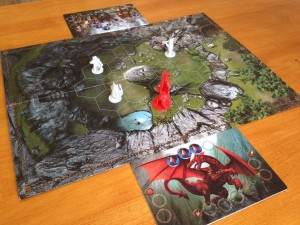 Drako is a 2-player, card-driven game by the designer who created K2 and The Cave. In Drako, 3 dwarves are pitted against one dragon with players taking turns drawing and playing cards from their hand.
Drako is a 2-player, card-driven game by the designer who created K2 and The Cave. In Drako, 3 dwarves are pitted against one dragon with players taking turns drawing and playing cards from their hand.
The two sides play very differently as each has their own specific deck of cards, plus the dragon is a single powerful figure which can fly around the board, use fiery breath and attack using powerful claws, whereas the 3 dwarf figures attack with their axes as well as each having their own special ability such as a crossbow or net. The game board shows a small hex-based grid which is the arena where the fight will take place.
Each turn, a player gets to perform 2 actions: Draw 2 cards or play 1 card. (Players have a hand limit of 6 cards.) Some cards display more than 1 option but a player can only 1 of the card’s options when played. For example, dwarf options include move 1 dwarf, move 2 dwarves, attack with 1 dwarf, attack with 2 dwarves, defend, use crossbow, and use net. Each move and attack icon has a value next to it which determines the amount of movement or power of the attack. When dwarves attack, they need to be adjacent to the dragon which is dangerous because the dragon could strike on its turn. Each dwarf has a special ability – one can use the crossbow, one can throw a net (which stops the dragon from moving until they spend a full turn escaping it), and one can give the dwarf player 3 actions during a turn once per game. Read the rest of this entry »
Tags: board game news, Board Games, board gaming, Drako, Rebel.pl
Posted in Board Game Review, Board Games, Drako | No Comments »
Posted by James (admin) on 15th July 2013
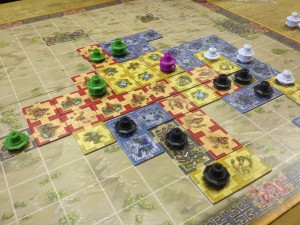
Note: The right-hand village should be owned by the white pagoda player as there are 3 white pagodas connected to it compared to 2 black pagodas.
Qin is a tile-laying game with a Chinese theme by Reiner Knizia. The winner is the first player to place all of their pagodas and players place pagodas on coloured territories they have created, so the game is about area control.
Players take turns placing 1 of the 3 tiles in their hand on the board next to any of the existing tiles. Each tile has 2 squares on it and each square can be red, yellow or blue. If a player creates a new contiguous territory of any single colour that consists of 2 squares or more, then they can claim that territory and place one of their pagodas on it. If a territory reaches 5 or more squares in size, then the owner adds a second pagoda to it.
If a tile joins two or more territories of the same colour together, then owner of the new large territory is the player who owned the most of the squares being combined. Territories of 5+ in size can never be merged.
Also on the board are some fixed black squares which are villages and these can be owned too. All the pagodas on territories that directly touch a village are added together – the player with the highest number places one of their pagodas on the village too. The pagoda on a village can change if the neighbouring territories change in a way to alter the totals and new clear winner emerges. Read the rest of this entry »
Tags: board game news, Board Games, board gaming, Knizia, Qin, Reiner Knizia
Posted in Board Game Review, Board Games, Essen Spiel 12, Qin | No Comments »
Posted by James (admin) on 14th July 2013
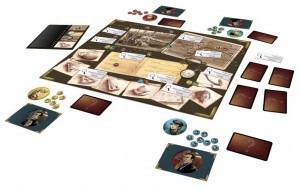 In Lady Alice, players are the kids on Baker Street who are trying to solve the kidnapping of explorer Stanley with Sherlock Holmes’s guidance. With that said, you’ll be unsurprised that Lady Alice is a deduction game.
In Lady Alice, players are the kids on Baker Street who are trying to solve the kidnapping of explorer Stanley with Sherlock Holmes’s guidance. With that said, you’ll be unsurprised that Lady Alice is a deduction game.
A crime has been committed and there are 4 pieces of information (categories) to work out: Where, Who, When and What. There are 8 different possibilities (clues) in each of the 4 categories (and there’s a card for each of the 32 clues). In the middle of the table is a board which shows Sherlock Holmes’s desk where all of the clues are displayed. (I’ll describe how the game plays with 4 players as it’s the most straightforward.)
At the start of the game, one card from each of the 4 categories is randomly drawn face-down – these 4 cards are the solution to the crime which are shuffled up and each player is dealt one at random. So, each player holds one of the 4 pieces of evidence and players don’t even know which category each of the other players holds. Read the rest of this entry »
Tags: board game news, Board Games, board gaming, Hurrican, Lady Alice
Posted in Board Game Review, Board Games, Lady Alice | No Comments »
 Lewis & Clark is a race to be the first player whose camp reaches the Pacific Ocean. Players have cards, indians and resources and each player has a board showing several boats in which they store their resources and indians, and which boat these are placed in also makes a difference too.
Lewis & Clark is a race to be the first player whose camp reaches the Pacific Ocean. Players have cards, indians and resources and each player has a board showing several boats in which they store their resources and indians, and which boat these are placed in also makes a difference too.









